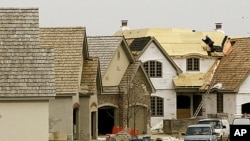In 2010, about 323,000 new homes were sold in the United States. That’s the worst year on record since 1963. The dismal housing market in the United States, flooded with abandoned properties and foreclosures, has forced many out of the home construction industry. The building suppliers and construction workers who remain in the U.S. Midwest are trying to deal with the worst economic environment their industry has seen in decades.
Builder Hal Stembridge started his construction business in 1979, during a recession, when interest rates were high and fewer new homes were constructed. Nothing he learned then could prepare him for what he’s dealing with now. “People say that it’s a recession when your neighbor gets laid off, it’s a depression when you get laid off, well this is just devastation," he said. "This is just coming out and wiping everybody in the trades… it’s just wiping everybody out.”
Stembridge is one of the few home builders in suburban Chicago still actively seeking the few customers who want to build new homes. He is fighting to say afloat, and directs some of his anger at the government.
“They’ve bailed out the banks. They’ve bailed out Wall Street. They’ve bailed out the car companies. But the largest employer in the United States is still suffering and that’s homebuilding,” Stembridge noted.
About 54,000 new homes were built in the Chicago area in 2005. So far this year, only about 3,000 building permits have been issued to start construction on new housing.
Brandon Weiss got into the new home construction business at the height of the boom. Now in the bust, he is surviving by retooling. “But kind of as the market dissipated in new construction, we had to find other ways and alternative measures of making ourselves relevant today. So we definitely went into remodeling as kind of a focus point for a while. We’re still there,” he stated.
Weiss purchased his recent remodeling project in a foreclosure. Now completely renovated, this house is one of the most energy-efficient homes on the market in Elgin, Illinois. It’s still for sale. “It’s tough right now. Showings are really slow. But I think that’s just market wide, not specifically on this house. It’s just the market in general right now.“
The dismal housing market has a ripple effect all the way up the supply chain to independent retailers like the Edward Hines Lumber Company. “Hines at their peak was at 27 locations," he explained. We’re down to four.”
Doug Jones is the President of Hines Lumber. “At the high point of Hines, they had over 1,200 employees. We’re a little over 100,” Jones said.
Jones says the low point for Hines in 2008 was 60 employees, but hiring has picked up, thanks to new investment in the company.
But Jones’s small, independent building supply company still competes with bigger retail stores and other small suppliers for the business that remains. “The new home construction, at least in Chicago, is down over 90 percent from where it was in 2007. So there are still enough suppliers out there but not enough people building homes. It just makes it tough. There’s not enough to keep them going,” he said.
Builder Stembridge says there would be enough to keep them going if the government stepped in to help. “The bottom line is each new home provides three jobs for one year in the U.S. and creates about $90,000 in tax revenue. I don’t understand why the government doesn’t get behind new home construction [and help them get] back up on its feet,” he stated.
Even interest rates at record lows (below five percent) have not encouraged people to buy or build new homes. And with unemployment rate in the U.S. at over nine percent, potential buyers are concerned about their jobs, and whether or not they can afford the mortgage that comes with home ownership.















